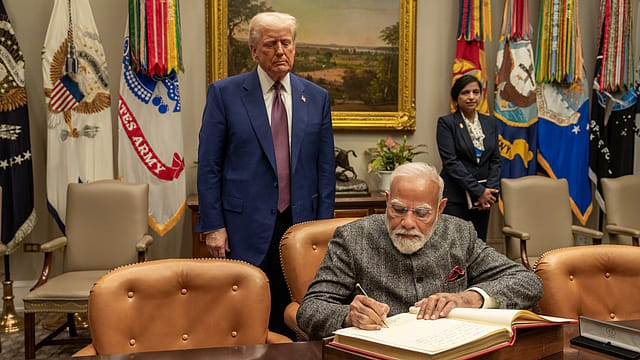Trump’s tariff pause nears end, pressure builds on U.S.-India mini trade pact
ADVERTISEMENT

With U.S. President Donald Trump stating that the temporary pause on import tariffs announced by him may not be extended beyond the July 9 deadline, there is only one week left for India to escape the tariff shock by agreeing to a mini trade deal with the United States. However, a hurried deal, if it happens, could hurt the interests of some—especially in the agricultural sector—stakeholders fear.
The July 9 deadline marks the end of President Trump’s 90-day suspension of the “Liberation Day” country-specific tariffs, originally announced on April 2. “If no agreement is reached by then, India faces renewed tariff uncertainty, though observers see a re-imposition as unlikely,” says Ajay Srivastava, founder of the Delhi-based Global Trade Research Initiative (GTRI).
According to Srivastava, a limited trade pact—styled after the U.S.-UK mini trade deal announced on May 8—is very likely in the coming days. “Under such a deal, India is expected to cut MFN (most favoured nation) tariffs on a wide range of industrial goods, including automobiles—a persistent demand from Washington. In agriculture, India may offer limited market access through tariff reductions and tariff-rate quotas (TRQs) on select U.S. products such as ethanol, almonds, walnuts, apples, raisins, avocados, olive oil, spirits, and wine,” he said.
Srivastava believes that India is unlikely to budge on sensitive sectors. “No tariff cuts are expected for dairy products or key food grains like rice and wheat, where farm livelihoods are at stake. These categories are politically and economically sensitive, affecting over 700 million people in India’s rural economy,” he adds.
Farmers in India’s major apple-producing states are worried. The Apple Farmers’ Federation of India (AFFI), the body of apple growers from Jammu and Kashmir (J&K), Himachal Pradesh (HP), and Uttarakhand, has appealed to the Chief Ministers of J&K and HP to be part of a joint delegation to meet Prime Minister Narendra Modi and demand that changes to the import duty on Washington apples be non-negotiable in the ongoing discussion on the India-U.S. trade deal.
“Apple imports are forecast this year to reach 6 lakh metric tonnes (MT), up from the actual 5 lakh+ MT in the 2023–24 season, as shipments from the U.S. continue to grow from last year’s record (even without the tariff reduction). Since 2001, our apple imports have climbed from 0.2 lakh MT to 6 lakh MT—from 1.7 per cent of domestic production to 22.5 per cent. Foreign apples from the U.S. and other countries are out-competing our domestic fruit, putting the lives of more than 8 lakh apple-growing households in peril,” AFFI leaders said in a statement.
In return for a mini trade deal, the U.S. is expected to refrain from reimposing the 26% country-specific tariffs announced on Indian goods on April 2, says Srivastava. “Instead, a 10% baseline tariff may apply to most imports from India—but the U.S. will not lower its own MFN tariffs on Indian exports. This means Indian goods will continue to face higher tariffs (MFN + 10%) in the U.S., while U.S. exports enter India at reduced or zero duties—raising questions about reciprocity,” he says.
This “mini-deal,” if concluded, would therefore focus on tariff reductions and strategic commitments, leaving broader FTA issues—including services trade, IP rights, and digital regulations—for future negotiation, he points out.